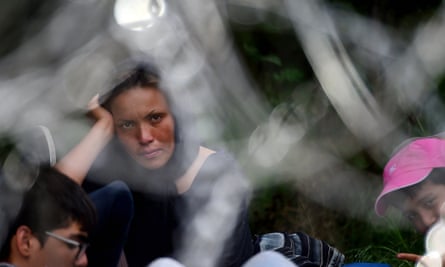The UN secretary general has condemned the Hungarian government’s treatment of refugees on its southern border, arguing that the use of teargas, pepper spray and water cannon on people fleeing war and hardship is not acceptable.
Hungary triggered outrage from the international community on Wednesday after firing gas canisters and spraying water at crowds of frustrated refugees who had briefly broken through a border gate in protest at being prevented from crossing from Serbia. With their path north from Serbia into Hungary – and the European Union – blocked since Tuesday, many migrants and refugees have simply turned west to the Croatian frontier. More than 5,000 people have entered since Hungary’s crackdown, Croatian police said.

Addressing Hungary, the UN chief, Ban Ki-moon, said: “I was shocked to see how these refugees and migrants were treated. It’s not acceptable ... since they are the people who are fleeing the violence and persecution, we must ensure our compassionate leadership.”
Hungary has portrayed its reaction as a legitimate response to an invasion, claiming without giving further details that a known terrorist was among one of the 29 people arrested during the clashes on Wednesday. In response, Serbian politicians condemned what they saw as an infringement of Serbian sovereignty.
Serbia’s prime minister accused Hungary of brutal and ”non-European” behaviour and urged the EU to respond. “We will not allow anyone to humiliate us. I call on the European Union to react, for its members to behave in line with European values,” Aleksandar Vučić told Serbian state television. “If the EU does not react, we will find a way to protect our borders and European values as well,” he said.
Tensions boiled over after thousands of refugees fleeing wars in Syria, Iraq and Afghanistan began arriving at the Horgoš border crossing between Serbia and Hungary in the hours after Budapest finally sealed it after months of threats to do so. For many refugees, whose understanding of how to navigate Europe is largely gleaned from the more than 170,000 people who had successfully transited through Hungary since the start of the year, the move came as a shock.
Many do not want to stay in Serbia, since its asylum system does not have the capacity to provide such a large influx with the long-term stability nominally guaranteed to refugees by the 1951 refugee convention. As a result, some of those camped at the Hungarian border believed they had made the dangerous sea journey from Turkey for nothing, causing tensions to spill over.
Police in Croatia, Serbia’s western neighbour, said 5,650 people had crossed the border at several points since early on Wednesday. On Tuesday, Croatia promised to welcome refugees and speed their transit through to northern Europe, raising hopes that tensions on the Hungarian border would be tempered in the coming days.
But Croatia’s interior minister said new measures might be considered as the number of people entering grew.
“Croatian police have full control on the border, but if the migrants continue flowing in from Serbia in large numbers, we will have to consider other ways of handling the situation,” Ranko Ostojić said during a visit to eastern Croatia late on Wednesday. Without specifying, he said the EU would have to handle “hot spots” before the migrants reach Croatia.
Croatia said it could cope with several thousand people, but not with tens of thousands. Migrants and refugees are at the moment being transported to reception centres near the capital Zagreb.
The prime minister, Zoran Milanović, met his Austrian counterpart, chancellor Werner Faymann, on Thursday to discuss the issue of refugees.
“We agreed on certain things,” Milanović told a government session. “Austria is a bigger country, but they also have their limitations to cope,” he said. “If the number of migrants continues increasing, I’m not sure we will be able register them all.”
An official with the United Nations refugee agency, UNHCR, said there were “significantly less people” waiting at the Serbian border in the vain hope of entering Hungary.